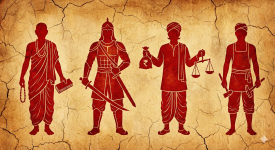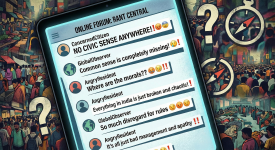India
The Trap That Runs Itself
Posted on 8 mins
There is a kind of social engineering so elegant that it requires almost no maintenance once set in motion. No ongoing conspiracy, no shadowy coordination, no continuous effort from whoever designed it. It just runs. The genius of it is that the very people it is used against become its most reliable operators. Understanding how this works requires setting aside the usual framework of oppressor-and-oppressed narratives, and instead looking at the mechanism underneath them — the actual lever being pulled and why it never stops moving.
The Uniformity Trap | Why Every Attempt to Fix Society Is Making It Worse
Posted on 16 mins
There is a pattern so consistent across history that it almost qualifies as a law of politics: when people encounter friction between groups, their first instinct is to abolish one of the groups. Not to manage the tension. Not to find a structure that holds both. To eliminate. The Marxist sees class conflict and concludes that class itself must go. The progressive sees gender friction and concludes that gender must go.
The Steel Frame That Never Bent | How Colonial Bureaucracy Became India's Permanent Bottleneck
Posted on 9 mins
When India’s Army Chief recently handed over twenty SUVs to the Sri Lankan military—a gesture saving them millions in rental costs—it prompted a question that echoes across decades of Indian foreign policy: why do we keep doing this? Why does India continue extending goodwill to neighbors with dubious track records of loyalty, repeating patterns that yield little strategic return? The answer, it turns out, isn’t about generosity or naivety.
Varna| The Natural Order We Refuse to Acknowledge
Posted on 4 mins
The traditional varna system has become a convenient target for modern criticism—dismissed as an archaic hierarchy incompatible with democratic values. Yet something curious happens when you observe contemporary society closely: the patterns that varna described haven’t disappeared. They’ve simply gone underground, operating informally while we collectively pretend they don’t exist. What Actually Happens Strip away the rhetoric about equal opportunity and meritocracy, and look at the facts. The child of lawyers becomes a lawyer.
The Rational Apathy | Why India's Borrowed Framework Breeds Dysfunction
Posted on 6 mins
The casual observer might blame India’s civic dysfunction on cultural deficiency or innate selfishness. The streets are filthy, systems are routinely exploited, and apathy seems universal. But this explanation is too convenient—it mistakes symptom for cause. The real answer lies not in the character of Indians, but in the nature of the system they inhabit. The Paradox of Rational Selfishness Consider a simple game theory experiment: two players must independently choose between options A and B.
The Performance Problem | On Authenticity and Language in Modern India
Posted on 6 mins
There’s a peculiar phenomenon that runs through the fabric of contemporary Indian society—an overwhelming emphasis on appearance over substance, on the performance of values rather than their practice. From religious observance to professional life, from political discourse to educational pursuits, the culture has become profoundly ornamental. The talk is loud, but the sincerity is thin. The Politics of Symbols Nowhere is this performative tendency more evident than in political discourse.
The Scale Problem | Why Large Democracies Struggle with Social Revolution
Posted on 7 mins
TLDR - Summary: Large democracies face unique challenges that smaller nations avoid. India’s billion-plus population hasn’t created mathematical impossibility of consensus—it has culturally chosen to grant permanent veto power to street protests, making electoral democracy meaningless when any small group can endlessly occupy public spaces without consequence. While America demonstrates that democracies can be agile despite polarization (swinging between extremes every four years), India remains paralyzed by its need to accommodate everyone, ultimately accommodating no one.
The Kalki Paradox | Divine Intervention and the Pattern of Hindu Resistance
Posted on 9 mins
TLDR - Summary: The Jugantar revolutionary movement in early 20th-century Bengal exemplifies a recurring pattern in Hindu resistance: initial promise grounded in authentic cultural foundations, followed by secular dilution and organizational fragmentation. Founded on Sri Aurobindo’s vision of spiritual nationalism, these gymnasium-based revolutionary cells achieved tactical sophistication—publishing influential newspapers, organizing funding through ideologically-sanctioned robberies, and coordinating international conspiracies—yet ultimately dissolved into the Indian National Congress and various secular political factions.
The Indian Judiciary and Hinduism | Some notable examples of Blatant Bias
Posted on 9 mins
Read the Main Article here - A Comprehensive Indictment of the Anti-Hindu Judiciary of Modern India Judicial Views on Hinduism/Sanatana in India The Indian judiciary’s record on Hinduism and Sanatana Dharma is mixed. Supreme Court benches have often described Hinduism/Hindutva in broad, inclusive terms, but in practice some judges have made controversial remarks or rulings affecting Hindu practices. Critics point to instances of alleged bias or anti-Hindu actions. Below are key examples (with sources) of judges’ statements or rulings relating to Hinduism or religion:
The Indian Judiciary and Hinduism | A Critical Historical Analysis of Colonial Legacy and Contemporary Challenges
Posted on 12 mins
TLDR - Summary: The Systematic Judicial Assault on Sanatan Dharma: Three Centuries of Institutional Colonization This comprehensive analysis exposes the shocking truth: India’s judiciary has operated as an instrument of cultural colonization for over 250 years, systematically dismantling Hindu religious autonomy while masquerading as neutral arbiters of justice. The Colonial Foundation (1757-1947): British rulers didn’t merely govern India—they reconstructed Hindu law itself. Warren Hastings’ “codification” project and the 1864 dismissal of native religious authorities marked the beginning of epistemological warfare against dharmic jurisprudence.